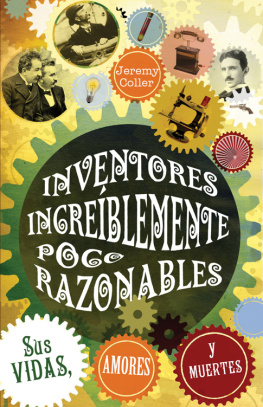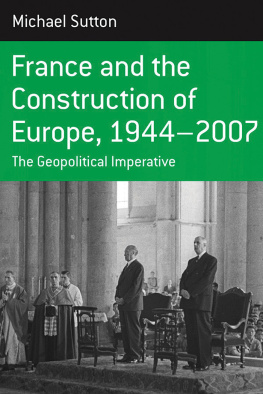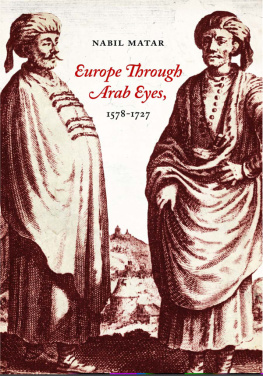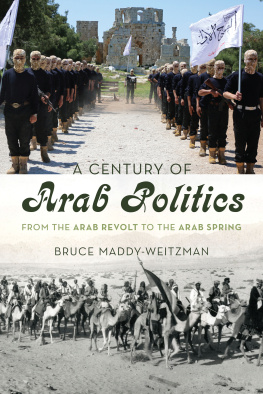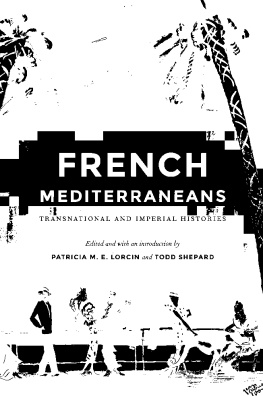Coller - Africa;North;France;Arab countries;Arabische
Here you can read online Coller - Africa;North;France;Arab countries;Arabische full text of the book (entire story) in english for free. Download pdf and epub, get meaning, cover and reviews about this ebook. City: Africa;North;France;Arab countries;Arabische Staaten;Berkeley;Frankreich;Frankrike;Arabländerna;Nort, year: 2011, publisher: University of California Press, genre: Romance novel. Description of the work, (preface) as well as reviews are available. Best literature library LitArk.com created for fans of good reading and offers a wide selection of genres:
Romance novel
Science fiction
Adventure
Detective
Science
History
Home and family
Prose
Art
Politics
Computer
Non-fiction
Religion
Business
Children
Humor
Choose a favorite category and find really read worthwhile books. Enjoy immersion in the world of imagination, feel the emotions of the characters or learn something new for yourself, make an fascinating discovery.

- Book:Africa;North;France;Arab countries;Arabische
- Author:
- Publisher:University of California Press
- Genre:
- Year:2011
- City:Africa;North;France;Arab countries;Arabische Staaten;Berkeley;Frankreich;Frankrike;Arabländerna;Nort
- Rating:5 / 5
- Favourites:Add to favourites
- Your mark:
- 100
- 1
- 2
- 3
- 4
- 5
Africa;North;France;Arab countries;Arabische: summary, description and annotation
We offer to read an annotation, description, summary or preface (depends on what the author of the book "Africa;North;France;Arab countries;Arabische" wrote himself). If you haven't found the necessary information about the book — write in the comments, we will try to find it.
Coller: author's other books
Who wrote Africa;North;France;Arab countries;Arabische? Find out the surname, the name of the author of the book and a list of all author's works by series.
Africa;North;France;Arab countries;Arabische — read online for free the complete book (whole text) full work
Below is the text of the book, divided by pages. System saving the place of the last page read, allows you to conveniently read the book "Africa;North;France;Arab countries;Arabische" online for free, without having to search again every time where you left off. Put a bookmark, and you can go to the page where you finished reading at any time.
Font size:
Interval:
Bookmark:
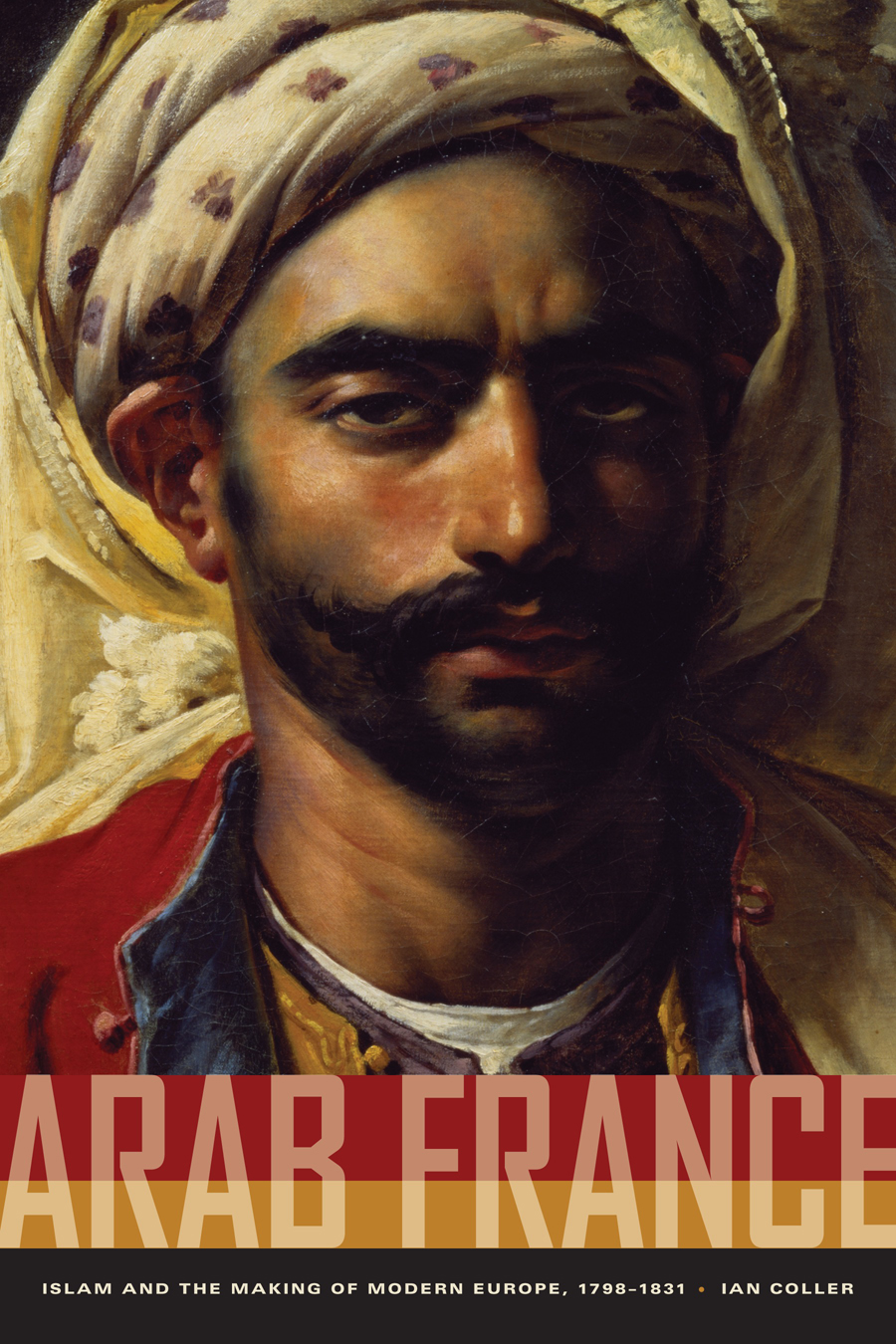
Arab France
Islam and the Making of Modern Europe,
17981831

Ian Coller

UNIVERSITY OF CALIFORNIA PRESS
Berkeley Los Angeles London
University of California Press, one of the most distinguished university presses in the United States, enriches lives around the world by advancing scholarship in the humanities, social sciences, and natural sciences. Its activities are supported by the UC Press Foundation and by philanthropic contributions from individuals and institutions. For more information, visit www.ucpress.edu.
University of California Press
Berkeley and Los Angeles, California
University of California Press, Ltd.
London, England
2011 by The Regents of the University of California
Library of Congress Cataloging-in-Publication Data
Coller, Ian, 1968.
Arab France : Islam and the making of modern Europe, 17981831 / Ian Coller.
p. cm.
Includes bibliographical references and index.
ISBN 978-0-520-26064-1 (cloth, alk. paper)
ISBN 978-0-520-26065-8 (pbk., alk. paper)
. FranceForeign relationsArab countries.. Arab countriesArab countriesFrance.. FranceForeign relationsAfrica, North.. Africa, NorthForeign relationsFrance.. AsianistsFranceHistory19th century.
. Islam and politics. I. Title.
DC59.8.A4C65 2011
704409034dc22 | 2010004922 |
Manufactured in the United States of America
20 19 18 17 16 15 14 13 12 11
10 9 8 7 6 5 4 3 2 1
This book is printed on Cascades Enviro 100, a 100% post consumer waste, recycled, de-inked fiber. FSC recycled certified and processed chlorine free. It is acid free, Ecologo certified, and manufactured by BioGas energy.
In late October 2005, as the first draft of this work was completed, two teenagers, Zyed Benna and Bouna Traor, were killed while under pursuit by police in the outer suburbs of Paris. Protests began in local communities and became more violent as they spread to most major cities in France. In the streets, cars burned, and police fired tear gas into crowds of teenagers from the largely Arab and African populations of overcrowded urban housing estates. Nicolas Sarkozy, then minister of the interior, dismissed the protesters as racaille (scum), comments that only fueled the conflagration of anger and protest. After three weeks of inexplicable silence, President Jacques Chirac at last appeared on television to acknowledge that France was confronting a crisis of meaning, a crisis of values, a crisis of identity. In his speech he declared: We will construct nothing of lasting value, until we embrace the diversity of French society. That diversity is written in our history: it is our richness and our strength. Since that time, the launch of a national debate on French identity has done nothing to resolve these urgent questions. This book derives in some sense from the deaths of these young men, from the contestation that followed, and from that unwilling recognition wrenched from the French state.
The paradox of French society today is that a nation that so long prided itself on its commitment to freedom and equality, its fearless intellectual critique, and its cosmopolitanism has been unable or unwilling to negotiate the realities of diversity and difference on its own soil. If the revolt of the suburbs showed that ethnic and cultural difference is largely confined to the outer zones of the urban agglomerations, it also made clear that such difference has been ghettoized at a distance from the center of French cultural identity. President Chirac spoke of the absence from the media and the government of what would elsewhere be known as minoritiesin France any terminology that suggests the existence of separate and distinct categories within the Republic is anathema. But this absence can be applied equally to the cultural self-representation of France today, and in particular to the historical identity that underpins this understanding. From Molire to the Revolution, from Napoleon to Jean Moulin, Frenchness has been determined above all by an identification with the historical past, a powerful sense of the continuity of French identity over time. In the shock that followed the collapse of the ancien rgime, the radical transformation wrought by the Revolution, the glory and suffering of the Napoleonic wars for empire, and the continuing instability of nineteenth-century regimes, a new breed of historians worked to construct a unity that seemed to be unsustainable at the political level, and this unity found its expression at last with the consolidation of the Third Republic at the close of the 1870s. Our ancestors the Gauls became the creed of the French history textbooks that taught generations of primary-school pupils to imagine France as an integral and eternal territorial and cultural unit. This idea of France inspired many of those who resisted the Nazi occupation after 1940, but also worked to mask the realities of collaboration and anti-Semitism during the Vichy years. In the 1950s it served to legitimate the destructive wars to retain colonial control in Asia and North Africa, and after decolonization and independence it helped erase the memory of those violent struggles.
It is for these and other reasons that Frances history of diversity has remained underdeveloped. To ask what role foreigners have played in the development of modern France has often appeared antithetical to what may be called the republican consensus of French historiography. Over the last two centuries, millions of immigrants arrived in France. Many came from Italy, Spain, Portugal, Poland, Belgium, Germany, and elsewhere in Europe. The ancestors of Adolphe Thiers and Lon Gambetta, those pillars of the Third Republic, were respectively Greek and Italian. Others came from outside Europe: Charles Aznavours parents were Armenian; Edith Piaf had an Algerian grandmother. Isabelle Adjanithe face of Marianne during the bicentenary of the Revolution in 1989also came from an Algerian family. But this diversity of individuals is tolerated, even welcomed, because it conforms to the French modelthe abandonment of cultural particularity, the irresistible alchemical transformation of the foreign into the French. There is little place in this model for questions about the way French society itself might change in response to the transformation of its population. And this model fails spectacularly in the face of those differences that are not, to use an inimitable French expression, soluble into the Republic: race and religion.
It was here that the shock of 2005and its ongoing sequelslay. The 1950s saw the populations of French colonies beginning to challenge their subaltern place in a culture imposed upon them by force. The beginning of the twenty-first century is a period in which the expanding diasporic populations across the globe have begun to question the cultural systems into which they have been inserted, as well as the societies that have signally failed to address persistent conditions of economic and social disadvantage. But the answer to this question cannot lie simply in jobs, black media personalities, and blind CVs, proposed in order to prevent employers from routinely jettisoning applications headed with Arab-sounding names.
The elephant in the salon of French culture is the glaring fact of ethnic and cultural diversity in contemporary France. Other societiesnotably within the anglophone worldhave undertaken a sustained investigation of the role of diversity in their national pasts, with rich and surprising consequences. The presence of non-Europeans in French history has remained until very recently little more than a footnote, a handful of exotic anecdotes scattered here and there. But there are signs that this is beginning to change. A growing interest in immigrants, Jews, and slaves, and the reconnection of their histories to the most central debates in French historiography, have been observable for several decades. And in recent years French historians have begun to interest themselves in new questions, such as the lives of people of color in France since the ancien rgime, the role of Oriental artisans in the development of French crafts and technologies, and the place of Islam and Muslims in French history.
Font size:
Interval:
Bookmark:
Similar books «Africa;North;France;Arab countries;Arabische»
Look at similar books to Africa;North;France;Arab countries;Arabische. We have selected literature similar in name and meaning in the hope of providing readers with more options to find new, interesting, not yet read works.
Discussion, reviews of the book Africa;North;France;Arab countries;Arabische and just readers' own opinions. Leave your comments, write what you think about the work, its meaning or the main characters. Specify what exactly you liked and what you didn't like, and why you think so.

